News Details
Disability rights photography by Harvey Finkle, SW’61, featured for second annual Art @ SP2 exhibit
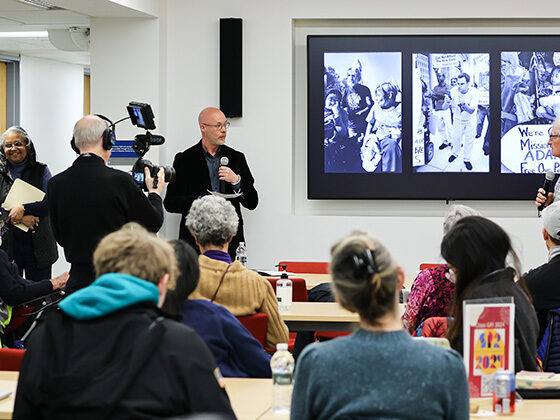
Authored by: Juliana Rosati
Photography by: Krista Patton
Student Life, Alumni
05/06/24
In the black-and-white still photographs displayed in the Caster building of Penn’s School of Social Policy & Practice (SP2), people with disabilities protest individually and in groups. Holding signs with phrases like “Cut a curb and save a life,” “Affordable accessible integrated housing,” and “Support psychiatric services,” members of the activist organization ADAPT/Disabled in Action advocate for equal access to the components of an independent life.
The images lining the lobby walls and rotating on a screen are the work of celebrated social justice photographer and SP2 alumnus Harvey Finkle, SW’61, who visited the School on April 3 for a special SP2 Minute event launching the exhibit. Generously on loan from Liberty Resources, Inc. in Philadelphia, a major provider of services for people with disabilities, the photos are selections from “Faces of Independence: Liberty Resources 30th Anniversary Project.”
“This exhibit aligns with our school’s mission to advance social justice, equity, and inclusion as well as belonging, and with all of you here today, I really feel this vibe of belonging,” said SP2 Associate Professor/Clinician Educator and Associate Dean for Inclusion Jerri Bourjolly, who leads two initiatives that presented the event, One Book, One SP2 and the SP2 Art Committee. Dr. Bourjolly welcomed the students, faculty, staff, and guests in attendance. These included friends and collaborators of Finkle, a number of whom were members of Liberty Resources.
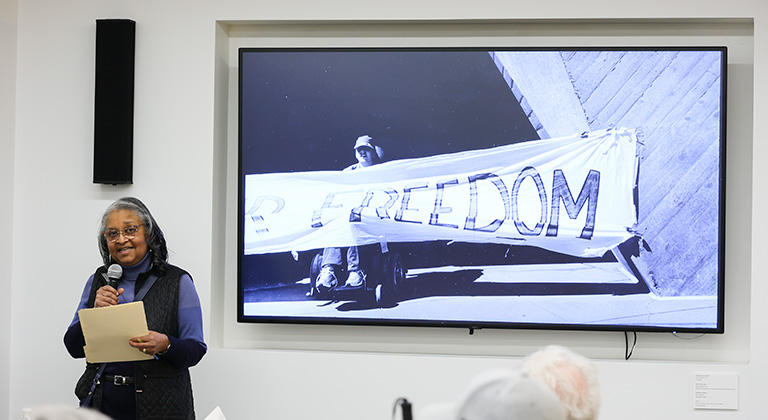
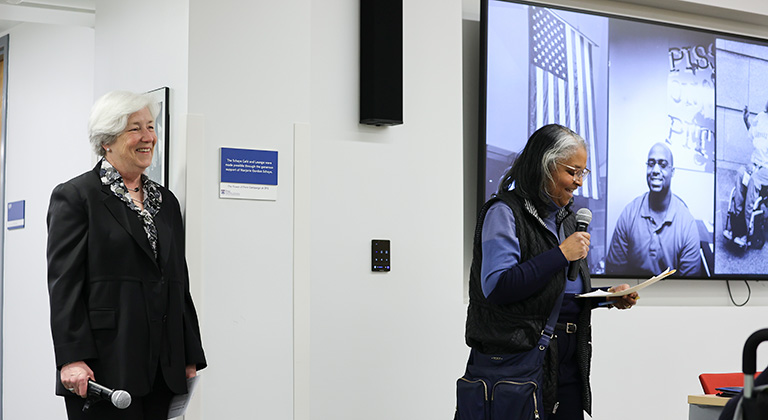
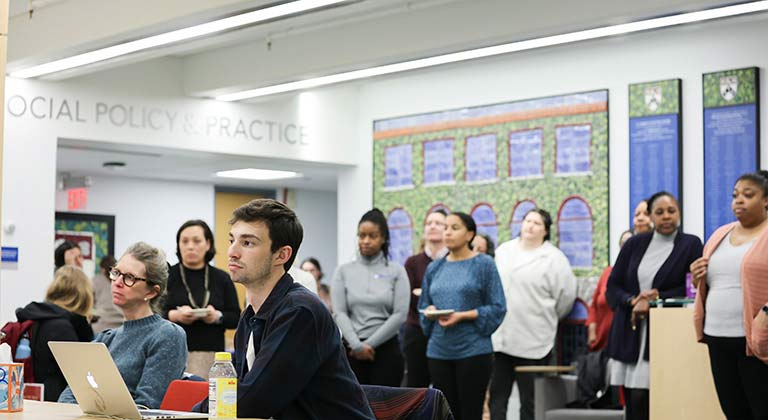
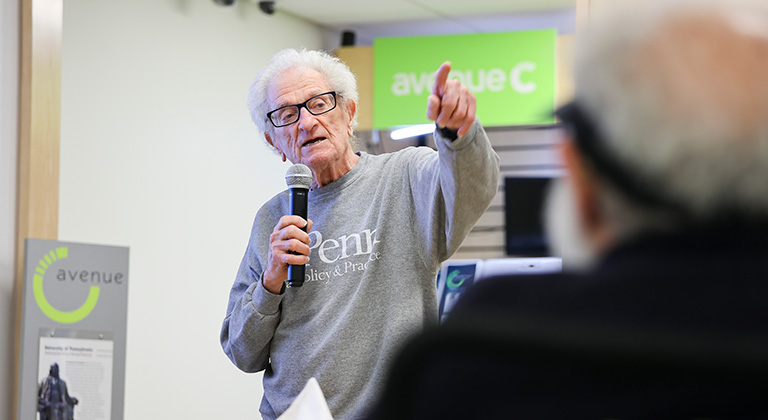
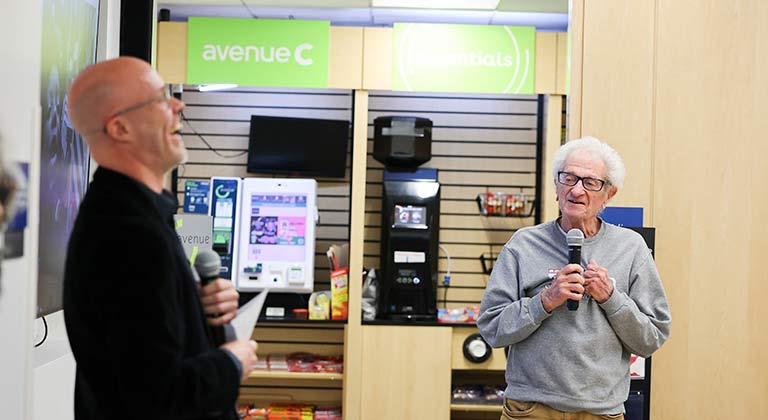
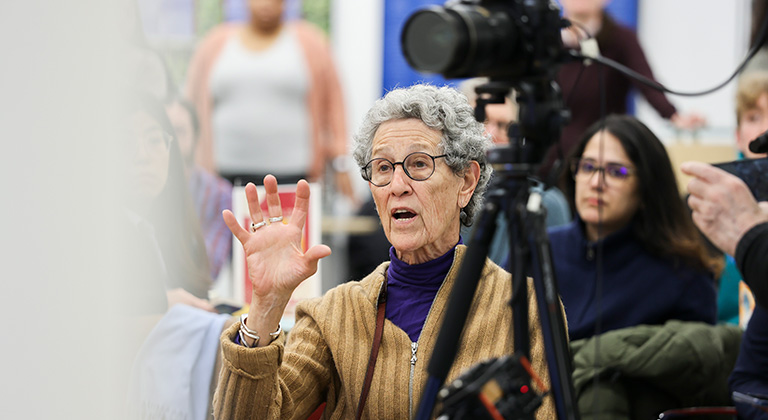
The event also began with remarks from SP2 Dean Sara S. Bachman. “My life has been spent doing policy work related to disabilities, including in the Independent Living Movement — services for people, working-age adults . . . who have long-term disabling conditions,” said Dr. Bachman. “And when I walked around the lobby and I looked at the photos, I was reminded of the decades of fighting for disability rights . . . We have more work to do. But your artwork makes it possible for all of us to see where we’re headed.”
SP2 Director of Institutional Advancement Bart Miltenberger, a member of the SP2 Art Committee who has known Finkle for years, led a Q&A discussion in which Finkle shared memories of a career documenting social change movements since the 1970s. Describing his transition to photography after thirteen years as a social worker, Finkle explained that the medium allowed him to express his commitment to social justice in a different way. “It wasn’t that I changed values, I just changed instruments,” Finkle said.
He recounted the circumstances behind the photos on view in the Caster lobby — primarily protests organized by ADAPT since the 1990s in which people with disabilities obstructed public roads and transit to advocate for better access, often risking arrest. In one situation, activists including a woman pictured in the exhibit sat half on the tracks and half in the car of a regional rail train.
“The issue was that there was only one way for them to get down and that was the elevator, and the elevator always broke down,” Finkle explained, recalling an ironic conclusion to the event — police arrested those protesting for better access, “and when they went to take them in the elevator, the elevator broke down.”
Over the decades, Finkle has worked in local, national, and international contexts to capture scenes and advocacy related to poverty, housing, education, health, abolition of the death penalty, immigration, and Deaf culture, in addition to disability rights. His body of work has been extensively exhibited and published and is archived at the Kislak Center for Special Collections at Penn’s Van Pelt Library.
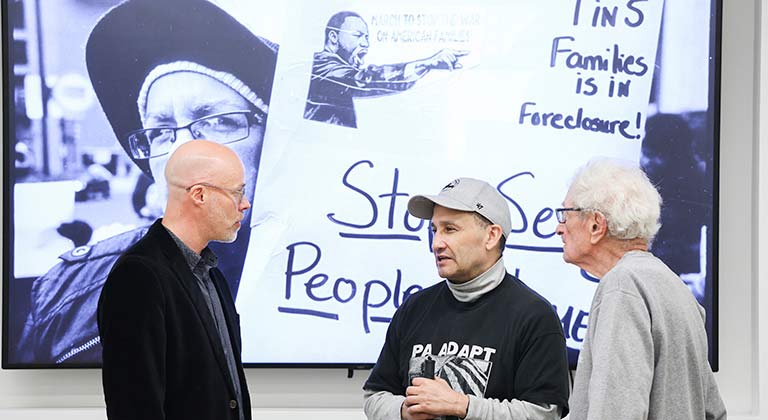
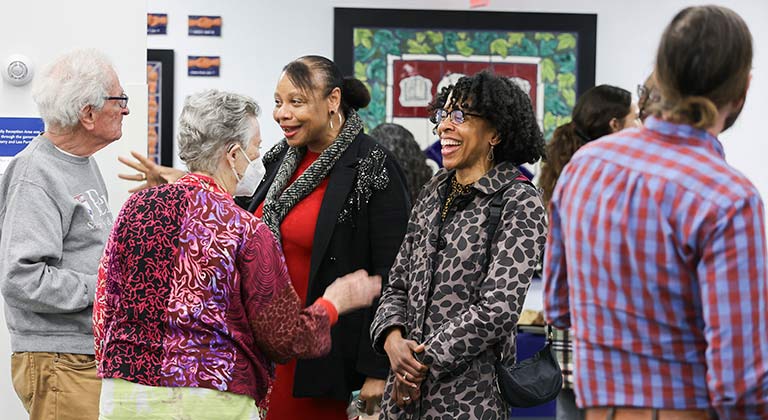
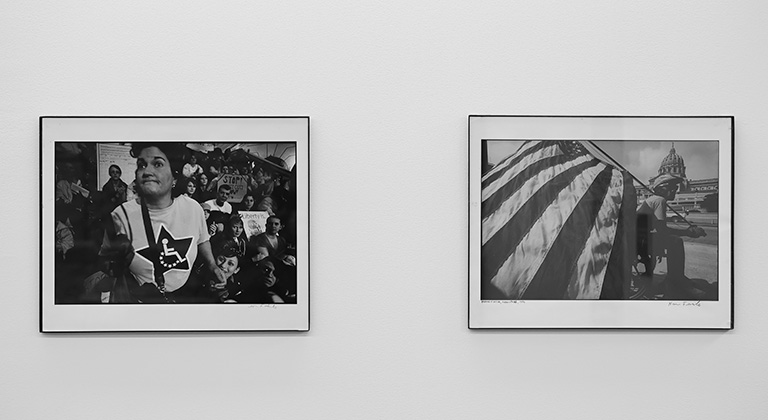
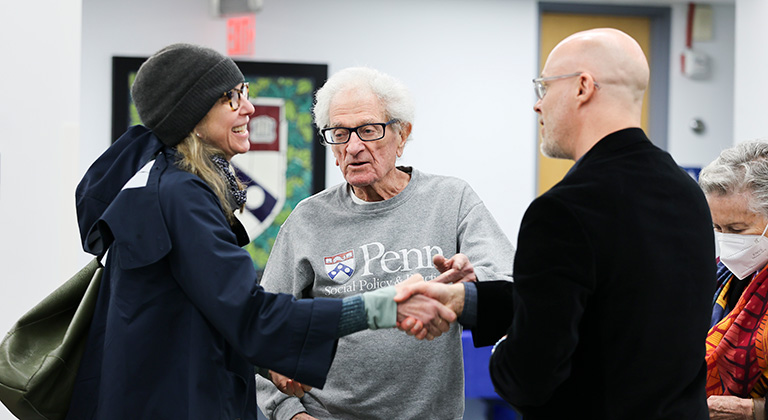
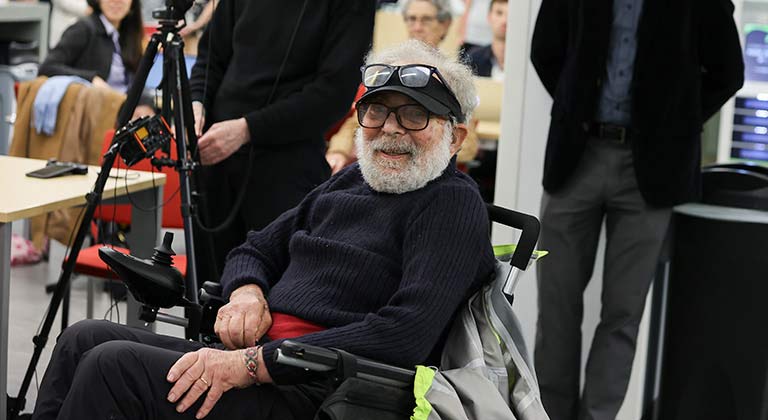
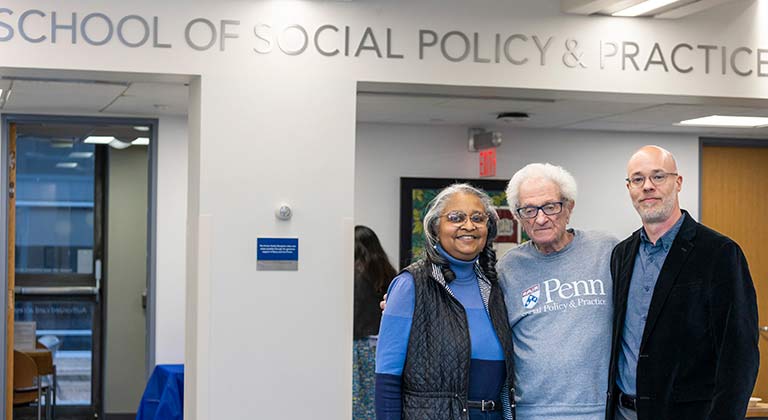
Asked what he is working on now, Finkle explained that he does not create new photography due to visual impairment from macular degeneration, but he is collaborating with a friend on a documentary about his career and is also at work on several new retrospective books of his photography on topics including reading, immigration, and mothers. Of the latter, he said, “People go around on Mother’s Day — they buy flowers, they buy chocolates, they buy cards. But meanwhile, I’ve been photographing people, in refugee camps and different places . . . many mothers are struggling. . . The chocolates are fine, but there’s much more to be done for them.”
At the end of their conversation, Miltenberger asked, “Any advice, Harvey, for young folks in the room pursuing social work, social justice work, any parting words of wisdom?” Finkle pointed to the advice he received as a student from a faculty member at SP2 who encouraged him to focus on what values he could bring to the field of social work. “I would just say, follow your values, whatever your values are, bring it to the front here, make it happen,” said Finkle.
As the second annual Art @ SP2 exhibit, “Faces of Independence” continues the tradition begun last spring with a community-wide exhibit featuring artwork by students, faculty, and staff.
People
-
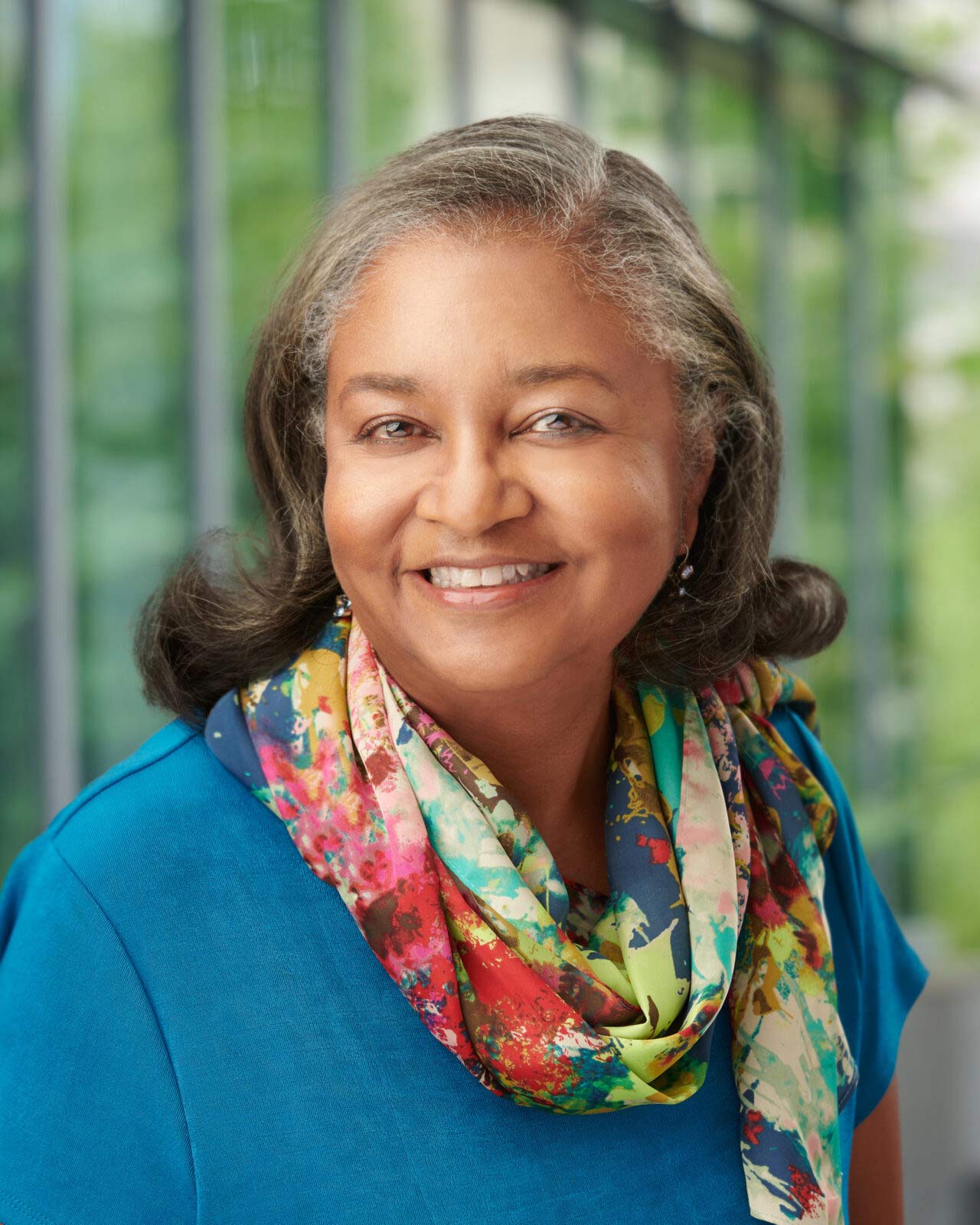
Joretha N. Bourjolly, MSW, PhD
Associate Professor/Clinician Educator
Contact
office: 215.898.5524
fax: 215.573.2099
Email
-

Bart Miltenberger
Director, Office of Institutional Advancement
Contact
office: 215.573.5624
fax: 215.573.2099
Email